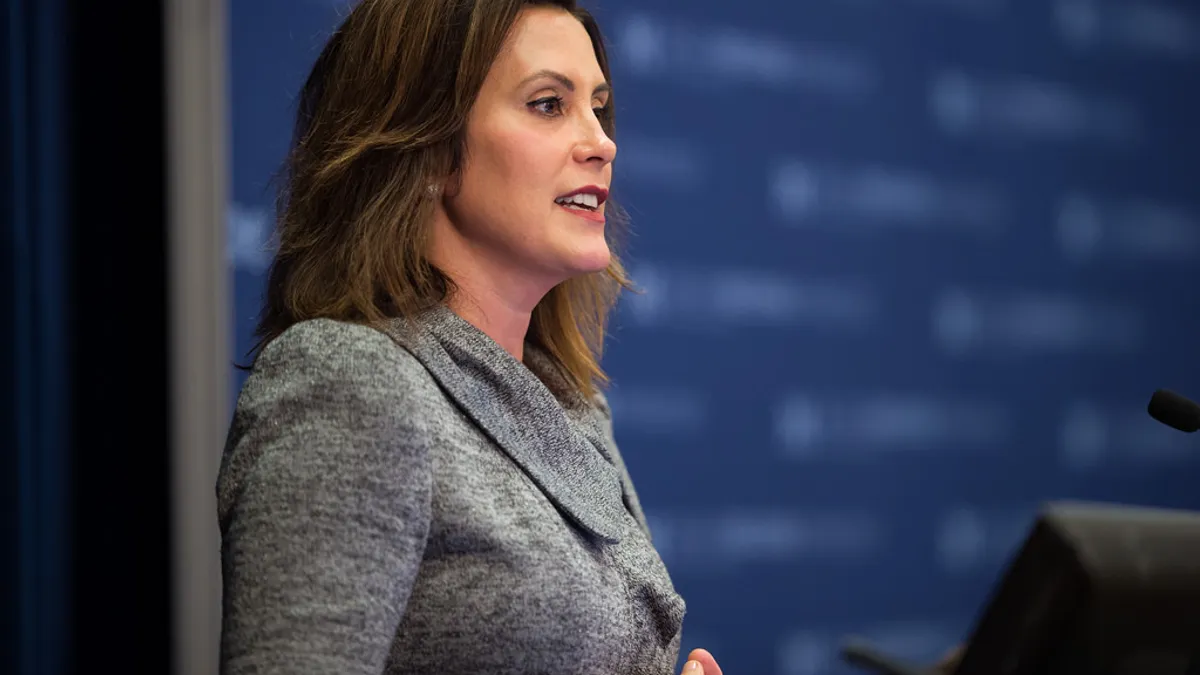UPDATE: Sept. 24, 2020: Michigan Public Service Commission Chair Dan Scripps responded to the governor's directive by asking the state to recommend how utility integrated resource plan requirements should be updated in order to meet Michigan's new target. He also noted that although utilities are the largest greenhouse gas contributors in the state, utilities have made strides to reduce fossil fuel generation and add cleaner resources.
"Driven by customer demand and declining prices, Michigan’s utilities have added thousands of megawatts of renewable resources like wind and solar, and are on track to exceed the statutory goal of obtaining 35% of generation by 2025 from the cleanest energy sources: renewable energy and energy waste reduction," said Scripps. The chairman will serve on Whitmer’s Council on Climate Solutions, established under her executive order.
Dive Brief:
- Michigan Gov. Gretchen Whitmer, D, on Wednesday signed an executive order committing her state to going carbon-neutral by 2050.
- The order calls for economy-wide emissions reductions by mid-century, with an interim goal of reducing greenhouse gas emissions 28% by 2025. It follows the governor's commitment last year to reach the U.S. goals under the Paris Climate Agreement — reducing greenhouse gas emissions 26-28% below 2005 levels by 2025.
- Michigan's new emissions reduction target is the most ambitious yet to come from a Midwest state, and calls for the state's energy and environmental regulator to have additional oversight over utility integrated resource plans (IRPs). Its two largest utilities — DTE Energy and Consumers Energy — have goals to reach net-zero emissions by 2050 and 2040, respectively.
Dive Insight:
Clean energy advocates at the outset of the COVID-19 pandemic had expressed concern that there would not be enough room in the state's budget to pursue substantive action on clean energy this year, and praised the order.
"As states continue to lead the charge in this fight, Gov. Whitmer has set a new bar in the Midwest and across the country to halt the rapid advance of climate impacts," Samantha Williams, climate and clean energy Midwest regional director for the Natural Resources Defense Council said in a statement.
Whitmer ran her 2018 campaign in part on bringing climate and clean energy policies to the state. Following her election, she signed three executive orders calling for economy-wide emissions reductions, and addressing other climate and environmental issues. But Wednesday's order goes farther cutting emissions entirely economy-wide by mid-century in part by reducing the state's dependence on fossil fuel imports and investing in renewable energy
"These bold actions will provide critical protections for our environment, economy, and public health, now and for years to come. It will also position Michigan to attract a new generation of clean energy and energy efficiency jobs," the governor said in a statement.
The majority of Michigan's electricity comes from fossil fuels — almost 40% came from coal and 23% from natural gas in 2018, according to estimates from the U.S. Energy Information Administration. Though the state produces some of its own natural gas, the majority of it is imported from Ohio, Indiana and Wisconsin, according to the EIA.
Transitioning to a carbon-neutral power sector and economy will benefit the state's environment and economy, Whitmer says in the order.
"To help meet its energy needs, Michigan annually sends billions of dollars out-of-state to purchase fossil fuels," the order reads. "Transitioning to carbon neutrality will enable Michigan to eliminate its dependence on out-of-state fossil fuels and take full advantage of this energy transformation."
Part of the plan directs the state's Department of Environment, Great Lakes, and Energy to have oversight on the environmental impacts of utility integrated resource plans.
"The Department must evaluate the potential impacts of proposed energy generation resources and alternatives to those resources, and also evaluate whether the IRPs filed by the utilities are consistent with the emission reduction goals included in this Directive," the order reads.
Michigan's investor-owned utilities both indicated their support for the directive. On Tuesday, DTE and Consumers announced they would join four other energy companies in facilitating the construction of an electric vehicle charging network across the Midwest, and the utilities touted their renewable energy and EV programs as assets to the governor's plan.
"Not only does Consumers Energy have a bold plan to invest in renewable energy ... we are working toward net zero greenhouse gas emissions goals for our electric and natural gas operations and have an extensive electric vehicle charging program," said Consumers spokesperson Katie Carey in an emailed statement. "We're eager to align those efforts with the governor's strategic vision for Michigan."
"We applaud Governor Whitmer's commitment to secure a clean energy future for Michigan. DTE Energy's goal to achieve net zero in carbon and methane emissions will play an important role in helping the state achieve economy-wide solutions," DTE President and CEO Jerry Norcia said in a statement.
The order also directs the state's Office of Climate and Energy to develop an action plan to bring the state to economy-wide carbon neutrality, to be submitted by Dec. 31, 2021. Annual reports tracking progress on the plan will be due to the governor every year after that, starting Dec. 31, 2022. In addition, the directive calls for all buildings owned by the state to be carbon-neutral by 2040 and to reduce energy consumption 40% by that time.
Finally, the order directs the state's Department of Treasury to establish an Energy Transition Impact Project in order to mitigate the harmful impacts of transitioning off fossil fuels, including tax revenue and employment loss. A separate order creates a Council on Climate Solutions in order to advise the Department of Environment, Great Lakes, and Energy on its action plan.














